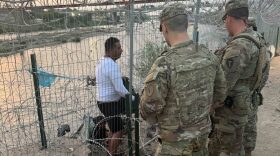It’s been more than a month since an apartment fire in Manchester displaced nearly 20 people, the majority of them refugees from the South Asian country of Bhutan. City officials called the fire suspicious, but they have yet to determine its cause. The fire has raised safety concerns in the city’s refugee community, among the most recent to make a home in Manchester.
It was close to midnight on a Saturday in early August when RajenGurung and his wife Tanka heard the commotion, smelled the smoke, and rushed out of the building with their three children.
They family was living in a four-story apartment building on Spruce Street, having come to Manchester from a refugee camp in Nepal about four years ago.
Tika Acharya, the executive director of the Bhutanese Community of New Hampshire, the main support group for the refugees, translated for the Gurungs during a recent meeting at the group’s Manchester offices.
“They felt that they’re one more time as refugee, they're going to be out on the street. so the fire had made them one more time in their life as refugee. so it’s a very bad experience that they’re feeling," Acharya said.
Through Acharya, Gurung said the experience has been especially trying for his children.
"The children feel more scary," Acharya translated. "They talk about the fire …so there's always a kind of trauma the children are carrying. They found the children behaving a little differently because they’re not willing to come out from home. ”
The fire destroyed nearly all of the residents’ belongings — the three refugee families who lived there didn't have renters insurance, and are now living with relatives.
Among some of the Bhutanese residents, suspicion turned to people who had taken to congregating in an adjacent alleyway. They allegedly drank and relieved themselves in the alley and on occasion harassed the residents.
"So in the past there were a lot people in the night from the street used to stop them from getting in the apartment building, so that time, they informed the landlord and the police were invited," said Sagar Tamang, another resident of the building.
The last incident, Tamang says, was three weeks before the fire. He stressed that it was only a rumor that vagrants may have started the fire.
An inspector with the city fire department said the cause of the blaze remains under investigation. Manchester’s fire chief and police chief did not return calls for comment.
Acharya explained that Bhutanese refugees began arriving in New Hampshire about eight years ago.
“They’re originally from Bhutan and evicted because of the political ethnic-cleansing problem way back before 1990," he said. "With the United States offer of resettlement since 2008, over 96,000 have already made their home in the United States.”
There are now an estimated 2,000 Bhutanese refugees in the state, most in Manchester and Concord. In Manchester, they’ve joined thousands of other refugees — from Bosnia, Sudan, Iraq and elsewhere — who have settled in the city in recent years. For many refugees, the Queen City has been a welcoming first home in America.
But there have also been challenges. Many of them have moved into the low rent districts of Manchester, in the center city where crime has been a rising concern. The building where the fire occurred is in one of the city’s tougher neighborhoods, with several shootings in recent years; there was a fatal one just this month.
“I think things are getting a little bit worse as compared to before," said Kamal Basnet, a leader in the Bhutanese community who lives in the neighborhood and runs an after-school program. "I don't know the reason, but there are a lot of things going on like drug issue, domestic violence and the poverty line that the families are facing.”
Refugee resettlement has at times emerged as a political issue, with Mayor Ted Gatsas in the past calling for a moratorium — in part because he said the city didn’t have the resources to support the refugees.
Despite the challenges, the Bhutanese community has made considerable strides in Manchester. They’ve opened two ethnic markets, a corner store near where the fire occurred, and one downtown, the Himalayas General Store. The Bhutanese Community of New Hampshire has expanded its offices and assists several refugee groups.
SagarTamang and the Gurungs all have steady jobs, and their kids are in school. TankaGurung stressed that on the whole people in Manchester have been welcoming.
“Wherever you go we have happiness and we have sorrow but, you know,'Manchester is a good place."
The Bhutanese Community is collecting donations to help the displaced families. The group can be contacted through its website: bhutanesecommunitynh.org.







